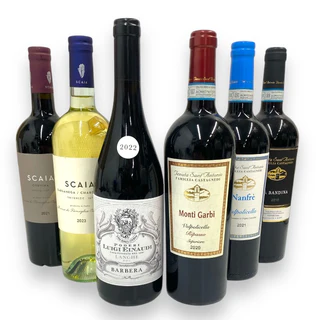Israel has one of the oldest wine traditions in the world, with a history that goes back thousands of years. From biblical references to modern, award-winning wineries, winemaking in Israel has undergone an impressive evolution. Today, Israel is known for its high-quality wines that have gained international recognition, thanks to the unique combination of ancient traditions and modern technology.
Ancient Wine Culture: From Biblical Times to the Romans
Wine growing in Israel dates back over 3,000 years and is mentioned in numerous biblical texts. Wine played an important role in religious rituals and daily life. King David and King Solomon are described in the Tanakh (Old Testament) as wine lovers, and archaeological finds show that wine production was an essential part of the economy in ancient Israel.
During the Roman period, Israeli wine was a sought-after export product. Wine jars with inscriptions from Israeli winemakers have been found in excavations in Italy, proving that these wines were consumed in Rome. However, the popularity of Israeli wine declined after the Islamic conquests in the 7th century, when alcohol production was largely banned.
The Resurrection of Israeli Wine
The modern Israeli wine industry was given a new impetus in the 19th century, thanks in part to Baron Edmond de Rothschild, owner of the famous Château Lafite-Rothschild in France. He saw potential in Israeli viticulture and financed the establishment of the first modern vineyards in Rishon LeZion and Zikhron Ya'akov. Rothschild introduced French grape varieties and modern winemaking techniques, laying the foundation for the high-quality wines that Israel produces today.
In the second half of the 20th century, Israel began to focus more on quality wines, thanks in part to investments in technology and improved viticultural practices. Winemakers experimented with different grape varieties and improved their knowledge of terroir, resulting in wines that gained international recognition.
Wine regions
Israel has a varied climate and soil types, resulting in different wine regions, each with its own character. The main wine regions are:
1. Galilee (Golan Heights, Upper Galilee and Lower Galilee)
Galilee is one of Israel's most prominent wine regions and is located in the north of the country. The high altitude vineyards (up to 1,200 meters above sea level) provide a cool climate with large temperature differences between day and night. This promotes the slow ripening of the grapes and contributes to complex and elegant wines. The Golan Heights in particular are known for their high-quality red and white wines.
2. Judea (Judean Hills and the Jerusalem area)
This region is located around Jerusalem and has a long history of winemaking dating back to the time of King Solomon. The vineyards are located on hills with chalky soils, which produces wines with good acidity and mineral notes. The Mediterranean climate, combined with modern winemaking techniques, makes this region ideal for the production of both red and white wines.
3. Samson (Shomron and the lowlands between Judea and the coast)
The Samson region includes the coastal plains and the foothills of the Judean Hills. The climate is warmer than the higher elevations, which allows the grapes to ripen more quickly, producing full, ripe wines. This area is known for its smooth, fruity wines.
4. Negev (desert area in southern Israel)
The Negev Desert covers much of southern Israel and at first glance does not seem like an obvious place for viticulture. However, innovative irrigation techniques make it possible to grow grapes here. The extremely dry conditions produce small, concentrated grapes that produce powerful, aromatic wines.
5. Sharon (coastal area near Tel Aviv and Haifa)
The Sharon Plain is Israel's largest wine-growing region and is located along the Mediterranean Sea. This area has a warm and humid climate, which makes full-bodied red wines thrive. Many of Israel's oldest wineries are located here.
Grape Varieties and Wine Styles
Israeli winemakers work with a mix of international and indigenous grape varieties. Some of the most common are:
- Cabernet Sauvignon & Merlot – The most widely planted grape varieties in Israel. They produce full-bodied, complex red wines with notes of ripe fruit, spice and chocolate.
- Syrah & Petit Verdot – Grapes that thrive in warm climates and are often used in blends for powerful red wines.
- Chardonnay & Sauvignon Blanc – Popular white grape varieties that produce fresh, aromatic white wines with notes of citrus and tropical fruit.
- Viognier & Gewürztraminer – Aromatic white grapes that produce floral and spicy wines.
- Marawi & Dabouki – Ancient indigenous grape varieties that have recently been rediscovered. They produce unique white wines with a refined and authentic character.
International Recognition and Future of Israeli Wine
Over the past decades, Israeli wines have won international awards and received praise from wine critics around the world. Wineries such as Golan Heights Winery, Castel, Barkan, Teperberg and Yatir have become established names in the global wine market.
Israeli winemakers continue to innovate, experiment with new grape varieties and terroirs, and improve their techniques. The focus is increasingly on sustainable viticulture and organic production methods. Thanks to these developments, Israeli wine remains a rising star in the international wine world.
Conclusion
Israel has a centuries-old wine tradition that has undergone an impressive transformation in recent decades. With its diverse wine regions, innovative winemakers and a strong focus on quality, Israel has firmly established itself as a producer of world-class wines.
Whether you’re a lover of full-bodied reds, crisp whites, or want to explore unique indigenous grape varieties, Israeli wine offers a wide range of flavors and styles worth exploring. 🍷
Our wines not only reflect the rich history of Israeli winemaking, but also offer a unique taste experience that will delight both connoisseurs and newcomers. These wines are also kosher wines , meaning they meet the strict requirements of Jewish dietary laws.
Discover our full range and experience the diversity and quality of Israeli wines for yourself.






